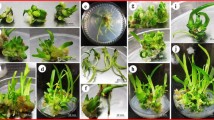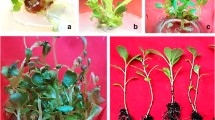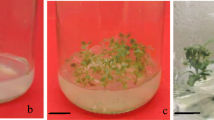Abstract
The present study reports enhanced in vitro mass propagation, synthetic seed production and its regeneration, acclimatization, and genetic fidelity assessment of in vitro regenerants of Bacopa monnieri (L.) Pennell; a medicinal plant renowned for its memory-enhancing property. For the first time, meta-Topolin (mT) as well as N6-benzyladenine (BA) and kinetin at their variable concentrations (0.5, 1. 1.5, 2 and 2.5 mg/l) were supplemented individually in Murashige and Skoog (Physiol Plant 15:473–497, 1962) (MS) basal medium to induce multiple shoots from shoot tip explants, initially collected from two-month-old vegetatively propagated plants. The best result in terms of multiplication (~ 7 shoots/explant) and biomass accumulation (~ 451.3 mg fresh weight, ~ 104.3 mg dry weight) was obtained in MS medium supplemented with 1 mg/l mT. For rooting of in vitro shoots, supplementation of 1.5 mg/l IAA and 0.5 mg/l IBA in MS media resulted in induction of the maximum number (~ 20) and highest length (~ 5.5 cm) of roots, respectively. Most efficient indirect regeneration and biomass production from green and hard basal calli (induced spontaneously in BA-supplemented media) was recorded in a simple MS medium. Synthetic seeds were produced from in vitro shoot tips using 2.5% sodium alginate and 75 mM calcium chloride solutions and were successfully regenerated in half-strength MS medium. Six-week-old in vitro regenerants were transferred to different substrates for acclimatization, among which cocopeat was found to be the best exhibiting the highest survival and growth in external conditions. Finally, molecular marker-(ISSR) and phenology-based genetic fidelity assessment of the in vitro regenerants exhibited that the in vitro regenerants were true-to-type in nature within themselves as well as with the mother plant.







Similar content being viewed by others
References
Ahire ML, Patil PP, Kishor PBK, Nikam TD (2012) Micropropagation and assessment of antibiotic selection in vitro of Bacopa monnieri (L.) Pennell. Int J Plant Dev Biol 6:34–39. https://doi.org/10.13140/2.1.2340.4167
Ahmad A, Anis M (2019) Meta-topolin improves in vitro morphogenesis, rhizogenesis and biochemical analysis in Pterocarpus marsupium Roxb.: a potential drug-yielding tree. J Plant Growth Regul 38:1007–1016. https://doi.org/10.1007/s00344-018-09910-9
Antony Ceasar S, Lenin Maxwell S, Bhargav Prasad K, Karthigan M, Ignacimuthu S (2010) Highly efficient shoot regeneration of Bacopa monnieri (L.) using a two-stage culture procedure and assessment of genetic integrity of micropropagated plants by RAPD. Acta Physiol Plant 32:443–452. https://doi.org/10.1007/s11738-009-0419-8
Asha KI, Devi AI, Dwivedi NK, Nair RA (2013) In vitro regeneration of Brahmi (Bacopa monnieri (Linn.) Pennell)—an important medicinal herb through nodal segment culture. Res Plant Biol 3:1–7
Banerjee M, Modi P (2010) Micropropagation of Bacopa monnieri using cyanobacterial liquid medium. Plant Tissue Cult Biotechnol 20:225–231. https://doi.org/10.3329/ptcb.v20i2.6917
Banerjee M, Shrivastava S (2008) An improved protocol for in vitro multiplication of Bacopa monnieri (L.). World J Microbiol Biotechnol 24:1355–1359. https://doi.org/10.1007/s11274-007-9612-3
Behera S, Nayak N, Shasmita, Barik DP, Naik SK (2015) An efficient micropropagation protocol of Bacopa monnieri (L.) Pennell through two-stage culture of nodal segments and ex vitro acclimatization. J Appl Biol Biotechnol 3:16–21. https://doi.org/10.7324/JABB.2015.3304
Chaudhry B, Kumar S, Tiku A, Maity PJ (2019) Micropropagation of a medicinally important plant: Bacopa monnieri. Med Plants 11:177–182. https://doi.org/10.5958/0975-6892.2019.00022.4
Dey A, Hazra AK, Nongdam P, Nandy S, Tikendra L, Mukherjee A, Banerjee S, Mukherjee S, Pandey DK (2019) Enhanced bacoside content in polyamine treated in-vitro raised Bacopa monnieri (L.) Wettst. S Afr J Bot 123:259–269. https://doi.org/10.1016/j.sajb.2019.03.012
Dixit H, Thakur A (2017) In vitro propagation of a medicinal important plant Bacopa monnieri from nodal explants. Indian J Res Pharm Biotechnol 5:1–4
Gantait S, Mitra M (2021) Role of meta-topolin on in vitro shoot regeneration: an insight. In: Ahmad N, Strnad M (eds) Meta-topolin: a growth regulator for plant biotechnology and agriculture, Springer, Singapore, pp143–168. https://doi.org/10.1007/978-981-15-9046-7_12
Gantait S, Kundu S, Ali MN (2015a) Influence of encapsulating agent and matrix levels on synseed production of Bacopa monnieri (L.) Pennell. Med Plants 7:182–187. https://doi.org/10.5958/0975-6892.2015.00026.X
Gantait S, Kundu S, Ali N, Sahu NC (2015b) Synthetic seed production of medicinal plants: a review on influence of explants, encapsulation agent and matrix. Acta Physiol Plant 37:98. https://doi.org/10.1007/s11738-015-1847-2
Haque MA, Ghosh B (2013) Micropropagation, in vitro flowering and cytological studies of Bacopa chamaedryoides, an ethno-medicinal plant. Environ Exp Biol 11:59–68
Hegazi GAE (2016) In vitro preservation of Bacopa monnieri (L.) Pennell as a rare medicinal plant in Egypt. J Basic Appl Sci Res 6:35–43
Hussain SA, Ahmad N, Anis M, Alatar AA (2019) Influence of meta-topolin on in vitro organogenesis in Tecoma stans L., assessment of genetic fidelity and phytochemical profiling of wild and regenerated plants. Plant Cell Tiss Organ Cult 138:339–351. https://doi.org/10.1007/s11240-019-01631-5
Joshi AG, Pathak AR, Sharma AM, Singh S (2010) High frequency of shoot regeneration on leaf explants of Bacopa monnieri. Environ Exp Biol 8:81–84
Kar Chowdhuri D, Parmar D, Kakkar P, Shukla R, Seth PK, Srimal RC (2002) Antistress effects of bacosides of Bacopa monnieri: modulation of Hsp70 expression, superoxide dismutase and cytochrome P450 activity in rat brain. Phytother Res 16:639–645. https://doi.org/10.1002/ptr.1023
Karthikeyan A, Madhanraj A, Pandian SK, Ramesh M (2011) Genetic variation among highly endangered Bacopa monnieri (L.) Pennell from Southern India as detected using RAPD analysis. Genet Resour Crop Ev 58:769–782. https://doi.org/10.1007/s10722-011-9695-4
Khilwani B, Kaur A, Ranjan R, Kumar A (2016) Direct somatic embryogenesis and encapsulation of somatic embryos for in vitro conservation of Bacopa monnieri (L.) Wettst. Plant Cell Tissue Org Cult 127:433–442. https://doi.org/10.1007/s11240-016-1067-5
Murashige T, Skoog F (1962) A revised medium for rapid growth and bioassays with tobacco tissue cultures. Physiol Plant 15:473–497. https://doi.org/10.1111/j.1399-3054.1962.tb08052.x
Muthiah JVL, Shunmugiah KP, Manikandan R (2013) Genetic fidelity assessment of encapsulated in vitro tissues of Bacopa monnieri after 6 months of storage by using ISSR and RAPD markers. Turk J Bot 37:1008–1017. https://doi.org/10.3906/bot-1207-24
Naik PM, Manohar SM, Praveen N, Murthy HN (2010) Effects of sucrose and pH levels on in vitro shoot regeneration from leaf explants of Bacopa monnieri and accumulation of bacoside A in regenerated shoots. Plant Cell Tissue Org Cult 100:235–239. https://doi.org/10.1007/s11240-009-9639-2
Parale A, Barmukh R, Nikam T (2010) Influence of organic supplements on production of shoot and callus biomass and accumulation of bacoside in Bacopa monniera (L.) Pennell. Physiol Mol Biol Plant 16:167–175. https://doi.org/10.1007/s12298-010-0018-6
Pathak A, Dwivedi M, Laddha NC, Begum R, Joshi A (2013) Detection of somaclonal variants using RAPD marker in Bacopa monnieri and Tylophora indica. J Agric Technol 9:1253–1260
Praveen N, Naik PM, Manohar SH, Nayeem A, Murthy HN (2009) In vitro regeneration of brahmi shoots using semisolid and liquid cultures and quantitative analysis of bacoside A. Acta Physiol Plant 31:723–728. https://doi.org/10.1007/s11738-009-0284-5
Rahe MA, Mollika SR, Khan MS, Banu TA, Amin GMA, Habib MA, Akter S, Islam M, Sharmin RA (2020) In vitro micropropagation of Bacopa monnieri (L.) Penn.—an important medicinal plant. Plant Tissue Cult Biotechnol 30:57–63. https://doi.org/10.3329/ptcb.v30i1.47791
Raj P, Anbumalarmathi J, Sharmili SA (2020) In vitro propagation of Bacopa monnieri (L.). Biotechnol J Int 24:32–39. https://doi.org/10.9734/bji/2020/v24i430111
Ramesh M, Vijayakumar KP, Karthikeyan A, Pandian SK (2011) RAPD based genetic stability analysis among micropropagated, synthetic seed derived and hardened plants of Bacopa monnieri (L.): a threatened Indian medicinal herb. Acta Physiol Plant 33:163–171. https://doi.org/10.1007/s11738-010-0534-6
Ramseh M, Marx R, Mathan G, Pandian SK (2007) Effect of bavistin on in vitro plant conversion from encapsulated uninodal microcuttings of micropropagated Bacopa monnieri (L.)—an ayurvedic herb. J Environ Biol 30:441–444
Rency AS, Satish L, Pandian S, Rathinapriya P, Ramesh M (2017) In vitro propagation and genetic fidelity analysis of alginate-encapsulated Bacopa monnieri shoot tips using Gracilaria salicornia extracts. J Appl Phycol 29:481–494. https://doi.org/10.1007/s10811-016-0918-0
Rout JR, Sahoo SL, Ray SS, Sethi BK, Das R (2011) Standardization of an efficient protocol for in vitro clonal propagation of Bacopa monnieri L.—an important medicinal plant. J Agric Technol 7:289–299
Shanker G, Singh HK (2000) Anxiolytic profile of standardized Brahmi extract. Indian J Pharmacol 32:5
Sharma S, Kamal B, Rathi N, Chauhan S, Jadon V, Vats N, Gehlot A, Arya S (2010) In vitro rapid and mass multiplication of highly valuable medicinal plant Bacopa monnieri (L.) Wettst. Afr J Biotechnol 9:8318–8322. https://doi.org/10.4314/AJB.V9I49
Sharma M, Raina H, Verma V, Mallubhotla S, Ahuja A (2012) Synthetic seeds a viable approach for conservation and propagation of phytoremediant herb: Bacopa monnieri (L.) Wettst. J Environ Res Dev 7:399–404
Sharma M, Gupta M, Salgotra RK, Sharma M, Singh AK, Gupta LM (2018) Scaling up of protocol for in vitro multiplication and conservation of elite genotype of Bacopa monnieri L. Pennell. Int J Curr Microbiol Appl Sci 7:1–12. https://doi.org/10.20546/ijcmas.2018.708.xx
Sharma N, Gowthami R, Pandey R, Agrawal A (2020) Influence of explant types, non-embryogenic synseed and reduced oxygen environment on in vitro conservation of Bacopa monnieri (L.) Wettst. In Vitro Cell Dev-PL 56:851–856. https://doi.org/10.1007/s11627-020-10078-9
Showkat P, Zaidi Y, Asghar S, Jamaluddin S (2010) In vitro propagation and callus formation of Bacopa monnieri (L.) Penn. Plant Tissue Cult Biotechnol 20:119–125. https://doi.org/10.3329/ptcb.v20i2.6890
Soundararajan T, Karrunakaran CM (2011) Micropropagation of Bacopa monnieri through protoplast. Asian J Biotechnol 3:135–152. https://doi.org/10.3923/ajbkr.2011.135.152
Sultana R, Perluigi M, Butterfield DA (2013) Lipid peroxidation triggers neurodegeneration: a redox proteomics view into the Alzheimer disease brain. Free Radic Biol Med 62:157–169. https://doi.org/10.1016/j.freeradbiomed.2012.09.027
Sumathy T, Subramanian S, Govindasamy S, Balakrishna K, Veluchamy G (2001) Protective role of Bacopa monniera on morphine induced hepatotoxicity in rats. Phytother Res 15:643–645. https://doi.org/10.1002/ptr.1007
Tata SS (2020) Development of a profused in vitro shoot multiplication using leaf explants of Bacopa monnieri (L.) Pennell. Curr Biol 11:14–17. https://doi.org/10.25081/cb.2020.v11.6030
Tiwari V, Singh BD, Tiwari KN (1998) Shoot regeneration and somatic embryogenesis from different explants of Brahmi [Bacopa monniera (L.) Wettst.]. Plant Cell Rep 17:538–543. https://doi.org/10.1007/s002990050438
Tiwari V, Tiwari KN, Singh BD (2006) Shoot bud regeneration from different explants of Bacopa monniera (L.) Wettst. by trimethoprim and bavistin. Plant Cell Rep 25:629–635. https://doi.org/10.1007/s00299-006-0126-5
Tripathi TB, Chaurasia S, Tripathi E, Upadhyay A, Dobey GP (1996) Bacopa monnieria Linn, as an antioxidant: mechanism of action. Indian J Exp Biol 34:523–526
Acknowledgements
The authors acknowledge the experimental assistance from Plant Tissue Culture laboratory at Regional Nuclear Agricultural Research Centre, Bidhan Chandra Krishi Viswavidyalaya, West Bengal, India.
Funding
This research did not obtain any specific grant from funding agencies in the public, commercial, or not-for-profit sectors.
Author information
Authors and Affiliations
Corresponding author
Ethics declarations
Conflict of interest
All the authors declare that they have no conflict of interest.
Ethical approval
This article does not contain any studies with human participants or animals performed by any of the authors.
Additional information
Communicated by M. Capuana.
Publisher's Note
Springer Nature remains neutral with regard to jurisdictional claims in published maps and institutional affiliations.
Rights and permissions
About this article
Cite this article
Pramanik, B., Sarkar, S., Bhattacharyya, S. et al. meta-Topolin-induced enhanced biomass production via direct and indirect regeneration, synthetic seed production, and genetic fidelity assessment of Bacopa monnieri (L.) Pennell, a memory-booster plant. Acta Physiol Plant 43, 107 (2021). https://doi.org/10.1007/s11738-021-03279-1
Received:
Revised:
Accepted:
Published:
DOI: https://doi.org/10.1007/s11738-021-03279-1




